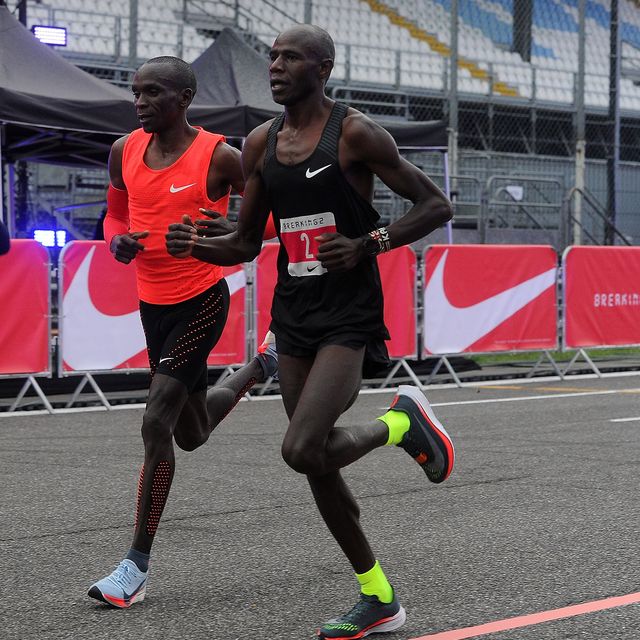
Pier Marco TaccaGetty Images
- New research published in the Journal of Applied Physiology aimed to understand what physiological demands are needed to run a two-hour marathon.
- Elite runners can take in oxygen twice as fast at marathon pace as a “normal” runner could while sprinting at their max effort.
- These physiological advantages are likely to have been optimized by genetic predisposition and long-term training.
- The good news for everyday runners is that these physiological factors—like running economy and lactate threshold—are very malleable with consistent training.
We all remember Nike’s Breaking2 project, when Eliud Kipchoge came within 25 seconds of breaking the elusive two-hour mark in the marathon. And that’s not to mention, Kipchoge’s subsequent marathon times which have hovered around two hours—and his 1:59.40 marathon in the INEOS 1:59 challenge. But what exactly is needed from your body to run 26.2 miles in this amount of time?
To understand the physiological demands of that kind of pace, researchers looked at 16 male distance runners who were part of the Breaking2 project.
Sign up for Runner’s World+ to become a stronger, faster runner!
In a study recently published in the Journal of Applied Physiology, the runners ran increments on a treadmill, with the speed continuously increasing until exhaustion, and ran outdoors on a track, holding a two-hour marathon pace before accelerating to max speed. Researchers measured the runners’ responses to pulmonary gas exchange rate (the flow of air into and out of the lungs, and the transfer of oxygen and carbon dioxide into the bloodstream), heart rate, and blood lactate (a substance made by muscle tissue and red blood cells, which carries oxygen from your lungs to other parts of your body) during this incremental exercise.
They also evaluated runners’ VO2 max (the maximum oxygen delivery and utilization for cardiovascular exercise) and lactate threshold (the point at which the concentration of lactate in the blood begins to increase rapidly).
Researchers found that a 59-kilogram (130-pound) runner would need to take in about four liters of oxygen per minute to maintain a two-hour marathon pace, which is 21.1 kilometers per hour (13.1 miles per hour, or 4:34.6 per mile). Also, they learned that based on their VO2 max, elite runners can take in oxygen twice as fast at marathon pace as a “normal” runner could while sprinting at their max effort.
The researchers also pointed out that these physiological advantages are likely to have been optimized by genetic predisposition and long-term training.
“First, we just have to marvel at the physiology of these great athletes,” lead study author Andrew Jones, Ph.D., professor of applied physiology at the University of Exeter in the U.K., told Runner’s World. “Second, the best marathon runners need a combination of excellent values. That includes exceptional running economy, the ability to operate at a high fraction of maximum without fatigue, and a high VO2 max—though not super high.”
The good news for everyday runners is that running economy—or how much energy you spend when running a certain pace—and lactate threshold are very malleable with consistent training, according to Jones.
This content is imported from {embed-name}. You may be able to find the same content in another format, or you may be able to find more information, at their web site.
Of course, as every runner knows, physical prowess is only half the equation when it comes to performance. Although the recent study didn’t include factors like mindset, grit, or motivation, other research has highlighted how importance those are in addition to physical efficiency.
For example, a recent study on marathoners and ultramarathoners found high levels of mental toughness and self-efficacy, and its lead study author suggested those attributes build up even more during training.
“What we found was a degree of mental toughness that was higher than for other sports, even those known for that quality, such as rugby and martial arts,” Geoff Lovell, Ph.D., the lead for Hartpury University’s Sport and Exercise Research Center in the U.K., told Runner’s World. “This tells us that just as you’re training your body for endurance and performance, you have to train your mind as well.”
Even if you never come anywhere close to that two-hour mark—an average finish for well-conditioned runners is closer to four to five hours—it’s helpful to train as if you’re in the elite category, Lovell suggested.
“Spend time learning how to show up for yourself,” he said. “Qualities like goal setting, positive self-talk, keeping your promises to yourself, and celebrating your achievements are helpful for training your brain to run better. But those habits also resonate beyond running.”
This content is created and maintained by a third party, and imported onto this page to help users provide their email addresses. You may be able to find more information about this and similar content at piano.io
"Hour" - Google News
December 04, 2020 at 11:30PM
https://ift.tt/3qo9iY9
What Does It Take to Run a 2-Hour Marathon? Let's Look at the Science - runnersworld.com
"Hour" - Google News
https://ift.tt/2WcHWWo
https://ift.tt/2Stbv5k
Bagikan Berita Ini


















0 Response to "What Does It Take to Run a 2-Hour Marathon? Let's Look at the Science - runnersworld.com"
Post a Comment